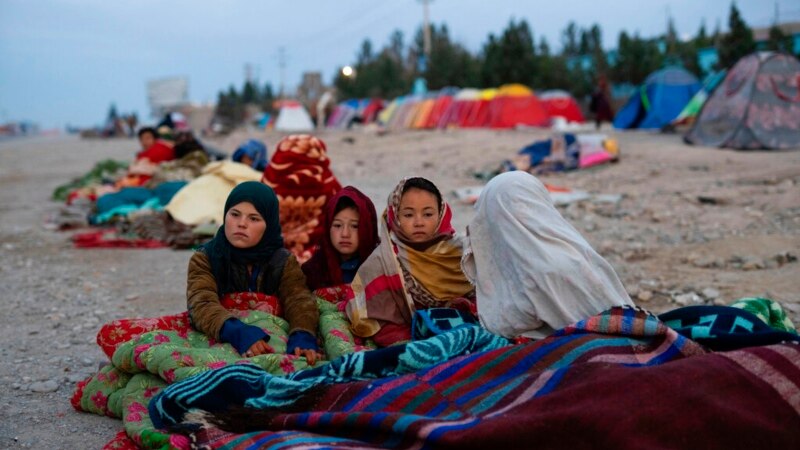
ISLAMABAD —
Representatives from the 57-member Organization of Islamic Cooperation (OIC) and the United States, Russia, China and the European Union are meeting Sunday in Pakistan to discuss ways to help Afghanistan avert a looming humanitarian catastrophe.
Pakistani officials said participants at the day-long meeting are “expected to explore avenues for containing and reversing the rapidly deteriorating humanitarian situation in Afghanistan and a potential economic collapse.”
The OIC-convened huddle will be the biggest international gathering on Afghanistan since the Taliban retook power from the Western-backed government in mid-August on the heels of a U.S.-led foreign troop exit from the country after 20 years. International donor institutions and the United Nations will also be in attendance.
Foreign Minister Amir Khan Muttaqi of Afghanistan’s Taliban held talks with Pakistan Foreign Minister Shah Mehmood Qureshi on the eve of OIC summit. (courtesy Pakistan foreign ministry)
The Taliban government’s acting Foreign Minister Amir Khan Muttaqi, who arrived Saturday, is expected to brief participants on difficulties facing his country.
“Our expectation is the conference will come up with a mechanism to coordinate humanitarian and economic assistance for Afghanistan,” Muttaqi told reporters in the Pakistani capital. “We also hope that it will also help in the revival of [the global community’s] normal relations with Afghanistan.”
Pakistani Foreign Minister Shah Mehmood Qureshi said the OIC meeting does not constitute an official recognition of the Taliban government but warned that “abandoning Afghanistan” would be a “historic mistake” because it would aggravate the humanitarian crisis and trigger a fresh exodus of refugees.
“We are not speaking of a particular group. We are talking about the people of Afghanistan. Please act and act now,” Qureshi said on the eve of the summit.
U.S. Special Representative Thomas West, who arrived in Islamabad Saturday, described the event as “a timely and important initiative.”
Sanctions, poverty, frozen assets
The August 15 Taliban takeover of the country has blocked its access to some $9.5 billion in Afghan central bank assets, largely held in the U.S. Federal Reserve. It has triggered international financial sanctions on the new rulers of the war-ravaged country and halted non-humanitarian assistance to a traditionally foreign aid-dependent economy.
The freezing of assets and abrupt suspension of aid have exacerbated economic upheavals in Afghanistan where the United Nations says 22.8 million people are experiencing acute food shortages stemming from years of war, a severe drought and high levels of poverty.
The sanctions and the lack of official diplomatic recognition of the Taliban government in Kabul have disrupted the banking system, undermining delivery of urgently needed humanitarian aid to Afghans.
The U.S. and other countries have cited concerns about terrorism and waning human rights, especially those of women, for refusing to directly engage with the Taliban. Those concerns stem in large part from the previous Taliban regime from 1996 to 2001, when girls were prevented from receiving an education, and women from leaving home unless accompanied by a close male relative.
“While we continue clear-eyed diplomacy with the Taliban—on human rights, terrorism, and educational access, among many other issues—the Afghan people will remain at the center of our considerations,” Ambassador West wrote in a subsequent tweet Saturday.
Taliban leaders repeatedly have promised their new administration will not bring back the harsh policies of their previous rule. But most Afghan girls across the country are still not allowed to return to school and most female government employees have been barred from resuming their professional duties.
The Islamist group insists its new regime is fully representative and would give women their due rights in line with Islamic laws or Sharia. Yet four months into the Taliban government, not a single woman has been included in the Cabinet.
Muttaqi insisted Saturday that diplomatic recognition was “a legitimate right” of his government. He went on to claim the end of the Afghan war has improved security, and that conflict-related casualties also have “dropped to zero” across the country since the Taliban regained power.
International aid organizations have acknowledged that working conditions and security for their operations significantly improved under Taliban rule as compared to when war was being waged across the nation.
Qureshi said Sunday’s conference will be a good opportunity for the world to share their concerns with the Taliban and for the Islamic countries to convey to them that Islam allows girls to attend schools, and for women to play a role in the governance and fully participate in the public life.
The Pakistani minister cautioned, however, against pressuring the Taliban, saying such a policy in the past had failed to produce the desired results.
“We have to be realistic about the options that we have. Let us nudge them through persuasion, through incentives to move in the right direction,” said Qureshi.


























